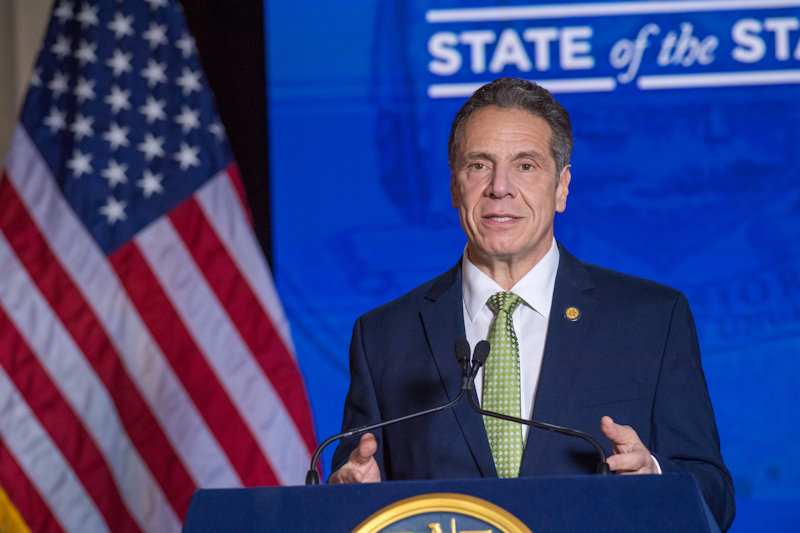
‘Pandemic honeymoon’ over, Cuomo fights for his political life
Every political sexual scandal is unique. And yet there are patterns that repeat themselves whenever an elected official is caught up in a cycle of accusations of misconduct. Some step down immediately if the scandal is particularly egregious or as one accuser after another comes forward. That was the case with former Governor Eliot Spitzer and Attorney General Eric Schneiderman. Others are defiant and unapologetic, going on the attack and even winning ensuing elections as voters shrug off the charges. There is an evident but mysterious tipping point where the pressures are just right to end political careers. Governor Andrew Cuomo has yet to reach that point.
Even admirers admit that Andrew Cuomo can be a bully, thin-skinned and vindictive.
You can now add “embattled” before his name.
The #metoo movement’s heightened sensibility just might topple the nation’s most powerful, famous and ambitious Democratic governor.
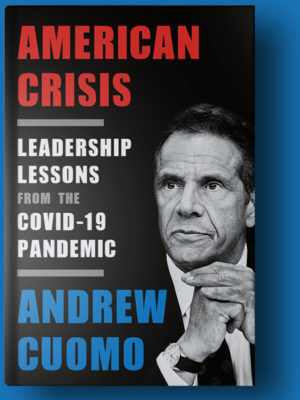
Cuomo’s future hinges partly on an investigation by two lawyers chosen by New York State Attorney General Letitia James to look into charges of sexual harassment. In addition, the Assembly’s Judiciary Committee has been authorized to investigate a slew of allegations that could lead to an impeachment. The first—and last—governor to be impeached and removed was William Sulzer in 1913.
The sexual misconduct charges began when former aide Lindsey Boylan, a Democratic candidate for Manhattan Borough president this year, claimed as early as December that the governor had been harassing her for years. Her accusation became more widespread on Feb. 24 and eight more women have followed with stories of their own. An anonymous woman claimed on March 9 that the governor had groped her in the Executive Mansion and on April 7 had more to say about her experiences.
But though allegations of sexual impropriety have drawn the most attention and commentary, the governor faces a host of problems that, collectively, could hasten the end of his political career:
• His administration’s handling of the coronavirus in nursing homes and promulgating a law that shielded nursing homes and workers from liability related to the pandemic. The law was repealed on April 6.
• Accusations of political pressure by his “Vaccine Czar” Larry Schwartz in distributing vaccines
• Charges that safety concerns at the Gov. Mario M. Cuomo Bridge were overlooked
• Revelations that, early in the pandemic, his family members and close aides/allies received special treatment in getting COVID-19 tests
• An ethics complaint filed by a watchdog group alleging that the writing and distribution of his bestselling book, American Crisis: Leadership Lessons from the COVID-19 Pandemic, violated campaign finance laws
Politicians Speak Out
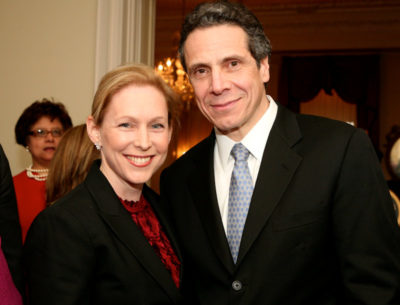
Not surprisingly, state Republicans, led by state GOP Chairman Nick Longworthy, have called on the governor to step down.
More concerning for Cuomo, the state’s most prominent Democratic elected officials have followed suit.
U.S. Senators Chuck Schumer and Kirsten Gillibrand on March 12 called for Cuomo to resign.
As of March 12, 59 Democratic members of the legislature have called for the governor to resign, as have 16 of the 19 Democratic congressmembers. A search of the web has not turned up any change in those figures.
On March 7, Cuomo—who has maintained his innocence—firmly stated that he would not resign, and would only be removed by impeachment. That was the sentiment he reportedly expressed in a phone exchange with the second most powerful person in state government, Senate Majority Leader Andrea Stewart-Cousins. Soon after, she stated that Cuomo ought to step down as his leadership would be affected by the distractions of scandal and investigations.
The third member of the trinity that governs the state as “three persons in a room,” Assembly Speaker Carl Heastie, stopped short of calling for a resignation, but stated, “We have many challenges to address, and I think it is time for the governor to seriously consider whether he can effectively meet the needs of the people of New York.”
Lt. Governor Kathy Hochul, who stands to take over if Cuomo resigns or is removed, called for an “independent review” on Feb. 27. On March 9, she said in a statement, “With yesterday’s announcement launching the independent [attorney general] investigation led by Joon H. Kim and Anne L. Clark, I am confident everyone’s voice will be heard and taken seriously. I trust the inquiry to be completed as thoroughly and expeditiously as possible. New Yorkers should be confident that through this process they will soon learn the facts.”
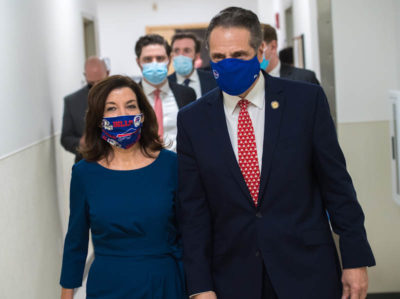
On March 11, the state Assembly announced it would open an impeachment investigation. It will be led by Judiciary Committee Chairman Charles Lavine (D–Glen Cove).
Five of the six Long Island state senators—all Democrats—who under the state constitution would act as jurors if the Assembly votes to impeach the governor, also weighed in.
Senators Anna M. Kaplan, John Brooks, Todd Kaminsky, Kevin Thomas, and James Gaughran said in a March 12 statement:
The recent allegations of sexual harassment and misconduct against the governor are beyond troubling and describe a disturbing pattern of behavior that also now includes a potentially criminal act. The gravity of these claims makes it clear to us that the governor cannot lead the state while faithfully responding to multiple investigations. This is especially true in light of the impending state budget deadline, the need to continue guiding the state through the pandemic, and the fragility of the state’s economic recovery.
Also on March 12, Democratic Congressmember Thomas Suozzi said in a statement:
The governor is entitled to due process on the many serious and disturbing allegations that have been made against him. I have confidence that the Attorney General and the NYS Assembly will conduct thorough investigations. The governor knows that the state still faces multiple crises that merit the undivided attention of its chief executive. I believe the governor must seriously consider whether he can effectively continue to govern in the midst of these unfolding allegations. If he cannot effectively govern with all of the controversy surrounding him, he must put the interests of all New Yorkers first and he should resign.
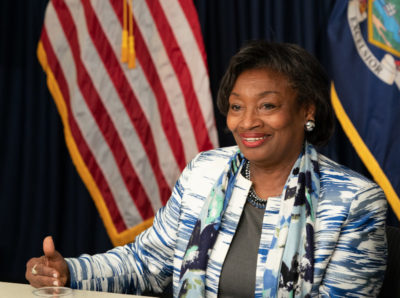
Anton Media Group also reached out to Democratic Congressmember Kathleen Rice for reaction, but did not hear back as of press time. Rice is on record as stating that Cuomo should step down.
A spokesperson for Nassau County Executive Laura Curran directed Anton Media Group to a brief interview she gave to News Channel 12. Asked if she would call on the governor to resign, Curran replied, “As the mother of three daughters, these allegations are terrible. My concern is that with each allegation and each day that goes by, the governor’s effectively diminishes.”
Asked a second time if she thought the governor should resign, Curran said she had faith in the investigation launched by the attorney general and the impeachment process, adding that she “wanted to see the facts come out and for the accusers to be taken seriously.”
On March 15, Nassau County Legislature Presiding Officer Richard Nicolello said in a statement:
The New York Times reported yesterday that members of the Cuomo administration, including state Vaccine Czar Larry Schwartz, reached out to multiple Democrat county executives across the state to gauge support for the scandal-ridden governor in one breath, and talk about vaccine allotments in another. The Majority is calling upon County Executive Curran to immediately disclose whether or not she was called, and what the outcome of the call was. Nassau residents deserve to know if their supply of the life-saving vaccine is now contingent upon political support for the governor.
Asked by Anton Media Group for a response, a spokesperson for Curran supplied the following statement by the executive: “I have had many conversations with Larry Schwartz over the past year including last week. At no time did I feel that vaccine allocation was being connected to support for the Governor.”
The Fall
Less than a year ago Cuomo was riding high midway through his third term and eying a fourth to surpass his father Mario. His daily coronavirus press conferences were must-watch television, and he drew admirers for his no-nonsense style of approaching the pandemic. He even wrote a book about his leadership in the crisis and earned an Emmy for his televised conferences.
Overlooked in the generally favorable media coverage were some missteps, such as nixing New York City Mayor Bill de Blasio’s wish to impose a shelter-in-place order, as had been done in Wuhan, China to “flatten the curve.” Cuomo, in refusing to authorize such an order, said at the time, “It cannot happen legally. No city in the state can quarantine itself without state approval and I have no interest whatsoever and no plan whatsoever to quarantine any city.”
According to a Scientific American editorial published earlier this year, “Cuomo did eventually lock down New York State, of course. But if he’d made the decision to do so a week earlier when de Blasio wanted, researchers modeled in May 2020 that perhaps 17,000 fewer people in the New York metropolitan area would have died.”
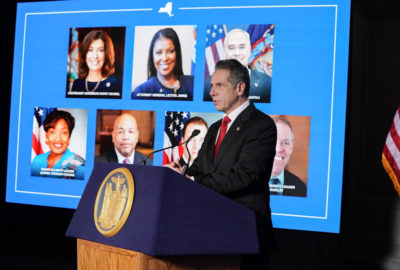
The same article also accused the governor of reducing the number of state hospital beds by the thousands during his tenure and, in preparing the 2020-21 spending plan, slashing the Medicaid budget by $400 million. Both of these actions, charged the magazine, exacerbated the problems faced by the state in dealing with the pandemic.
Republicans and Cuomo’s critics also charged that his administration was hiding the true figures of nursing home deaths in a state that was the hardest hit by the COVID-19 disease and had the second highest per-capita deaths. This came after a Cuomo order that forced homes to admit patients who had tested positive and forbid facilities to test prospective residents. The order was reversed under pressure on May 10, but critics contend that many needlessly died as a result.
Cuomo’s directive, under difficult circumstances at the beginning of a pandemic that even experts did not fully understand, had done little to dent his popularity, much less threaten his political future. The alleged mishandling failed to gain traction until the past couple of months, when the administration admitted that it had undercounted the number of COVID-19 deaths in nursing homes.
Then in quick succession came a series of events that have shaken the foundations of his power. Attorney General James said on Jan. 28 that an investigation revealed that the administration undercounted nursing home deaths by as much as 50 percent. The FBI is also reportedly investigating the nursing home deaths, “focusing on whether the governor and his senior aides provided false data on resident deaths to the Justice Department,” according to the New York Times.
On Feb. 12, a Cuomo aide admitted in a call with state Democratic leaders that the governor had intentionally delayed releasing nursing home data due to fears of a federal investigation. Democratic Assemblyman Ron Kim of Queens revealed a threatening phone call from the governor after he publicly criticized Cuomo’s handling of nursing homes during the pandemic.
The ensuing string of sexual harassment accusations have put the governor in the position of fighting for his political life.
Poll Dive
Albany insiders have long talked of a toxic culture in the capital (and capitol), not just limited to the governor. But since Cuomo has dominated politics so thoroughly for the past decade, the focus has been on the activities in the executive branch.
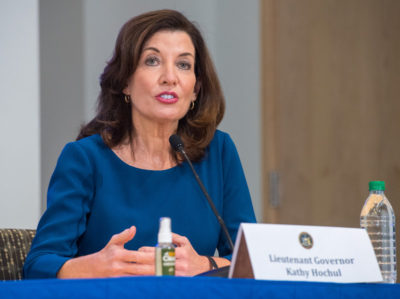
The governor has had his ethical brushes before, but avoided consequences. He won three elections in relatively easy fashion and at one point last year his approval rating touched near 80 percent. But just as his response to the pandemic drove his popularity, revelations of mismanagement and sexual impropriety have lowered his favorability numbers.
The latest poll by the Siena College Research Institute showed a majority still want him to continue in office. Per the press release:
Voters say 50-35 percent that Governor Andrew Cuomo should not immediately resign. By 48-34 percent, they say he can continue to effectively do his job as governor. One-third of voters say that Cuomo has committed sexual harassment, one-quarter say he has not, and a plurality are unsure. Voters are satisfied with the way Cuomo has addressed the allegations, 57-32 percent, according to a new Siena College Poll of New York State voters, conducted March 8-12.
Voters approve of Cuomo’s handling of the pandemic, 60-33 percent, virtually unchanged from 61-34 percent last month. Voters give Cuomo positive grades on four specifics related to the pandemic— communicating, providing accurate information, reopening plans, and managing the vaccine rollout—however, when it comes to making COVID-related nursing home death data public, voters give Cuomo a negative grade, 27-66 percent.
Cuomo has a 43-45 percent favorability rating, down significantly from 56-39 percent in February. His job performance rating is 46-52 percent, down from 51-47 percent last month. Currently, 34 percent of voters say they are prepared to re-elect Cuomo if he runs for re-election in 2022 and 52 percent say they would ‘prefer someone else,’ down significantly from 46-45 percent in February.
According to City & State, the governor still enjoys wide popularity among the Black community and Black clergy, who wrote a letter of support that was sent to reporters.
In the same article, New York Public Interest Resource Group President Blair Horner said, “(Cuomo) not only is not afraid to fight, he likes to fight. This is about his legacy, and if he can sort of punch his way through it, he may feel vindicated.”
Charles In Charge

On March 11, according to a press release, Speaker Heastie “authorized the Assembly Judiciary Committee to begin an impeachment investigation to examine allegations of misconduct against Governor Cuomo. [T]he committee would have the authority to interview witnesses, subpoena documents and evaluate evidence, as is allowed by the New York State Constitution. On March 17, Speaker Heastie and Chair Lavine announced that the Assembly had retained the law firm Davis Polk & Wardwell LLP to lead the impeachment investigation.”
“The Judiciary Committee’s primary focus remains investigation into issues related to sexual harassment, the nursing homes and bridge safety,” Lavine told USA Today, adding that his committee will also look into the book deal.
The latest issue that Lavine’s committee will investigate involves preferential treatment for Cuomo family members during the early days of the pandemic. According to a March 26 article in City & State:
At a time when many New Yorkers could not get tested for COVID-19, Cuomo reportedly helped family members get special access alongside state officials whose health actually mattered to the public at-large. The state Public Officers Law states that officials cannot give “unwarranted privileges or exemptions” to themselves or others. Some say that includes dispatching state police to your brother’s house in the Hamptons to escort test samples back to an Albany lab.
One of Cuomo’s alleged victims, Charlotte Bennett, questioned the objectivity of the law firm Davis Polk & Wardwell, claiming a conflict of interest since a former partner at the firm, Dennis Glazer, was tabbed by Cuomo to the SUNY board and a casino selection panel. Glazer is also the husband of Janet DiFiore, chief judge of the Court of Appeals. DiFiore, appointed by Cuomo, would preside over his trial if the Assembly votes to impeach.
Boylan, the first to publicly accuse the governor, said in a tweet that she won’t participate in the Assembly inquiry: “I am in conversation with other who have no interest in your corrupt, cynical ‘investigation.’ Hard pass.”
Asked about the law firm by Anton Media Group, Lavine said, through a spokesperson, “The nation’s leading ethical experts stated there is no conflict of interest. Davis Polk is an internationally respected law firm.”
On April 1, Lavine announced the establishment of a hotline for members of the public to provide information relevant to the Assembly’s impeachment investigation of the governor. “Individuals who wish to provide information relevant to the investigation may contact Davis Polk & Wardwell LLP, the law firm leading the investigation, either by email at NY.Assembly.Investigation@davispolk.com or by phone 212-450-3600. Information provided will remain confidential,” read a press release.
First elected in 2004, Lavine, 73, is reportedly well-respected by colleagues in both parties. A profile in Gannett Albany notes, “He is a quiet force in his chamber and avoids the press. Lavine is well-respected for a prior chairmanship on the Assembly ethics committee. He oversaw investigations of other Democrats involved in sexual harassment scandals.”
In a statement on the floor of the Assembly, Lavine said, “Given the breadth and seriousness of the issues under investigation, we expect that the timing will be in terms of months rather than weeks. There is very little precedent for impeachment in New York, we are mindful of the due process necessary to ensure the fairness of this process to everyone, the victims, the witnesses and the governor, and to do so in a transparent manner, so that all New Yorkers are in.”
The Buffalo News also profiled the assemblyman, who finds himself in an unexpected spotlight and said he understands the historical implication of the investigation he leads.
Cuomo Responds
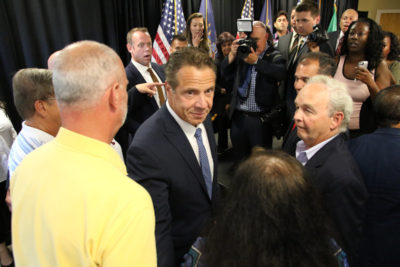
On Feb.28, the governor gave his longest statement on the charges swirling around him:
Questions have been raised about some of my past interactions with people in the office. I never intended to offend anyone or cause any harm. I spend most of my life at work and colleagues are often also personal friends.
At work sometimes I think I am being playful and make jokes that I think are funny. I do, on occasion, tease people in what I think is a good natured way. I do it in public and in private. You have seen me do it at briefings hundreds of times. I have teased people about their personal lives, their relationships, about getting married or not getting married. I mean no offense and only attempt to add some levity and banter to what is a very serious business.
I now understand that my interactions may have been insensitive or too personal and that some of my comments, given my position, made others feel in ways I never intended. I acknowledge some of the things I have said have been misinterpreted as an unwanted flirtation. To the extent anyone felt that way, I am truly sorry about that.
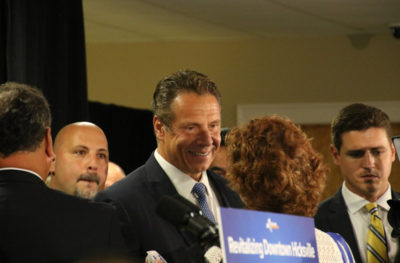
To be clear I never inappropriately touched anybody and I never propositioned anybody and I never intended to make anyone feel uncomfortable, but these are allegations that New Yorkers deserve answers to.
That’s why I have asked for an outside, independent review that looks at these allegations.
Separately, my office has heard anecdotally that some people have reached out to Ms. Bennett to express displeasure about her coming forward. My message to anyone doing that is you have misjudged what matters to me and my administration and you should stop now—period.
Hofstra Professor Weighs In
Anton Media Group interviewed Craig Burnett, who teaches political science, including state and local government and social science statistics, at Hofstra University.
Q: Do you see Cuomo stepping down?
A: It’s hard for me to see him resigning right now. He seems pretty committed and it sounds like he’s got enough support. They’re saying, “Look, let the attorney general do the investigation and then we’ll see what happens.” He’s still governor for the next year and a half. You need to work with him. Up until a month or two ago, he was a really good fundraiser for [the party].
Q: Do you find it surprising that the sexual harassment aspect of his problems seems to have eclipsed the nursing home scandal?
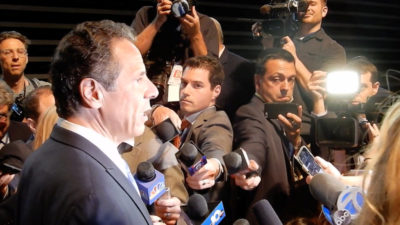
A: And the [alleged structural problems at the] bridge. The bridge is a brand new thing. We don’t know how that will unfold. From the standpoint of the voters it’s a lot easier to understand the sexual harassment, the sexual misconduct, than it is to understand what happened with the nursing home data and the [pandemic] policies. Obviously, to those people directly affected by [Cuomo’s decision], it hits close to home. But for those of us who didn’t have that experience, we probably sensed that there was something that we don’t like about it, but we’re not exactly sure what that was. I think it’s easier for people to hear the stories of these women, to sort of internalize what that means, especially in the #metoo era. It’s been widespread in all kinds of industries. It’s been known to people who follow Albany that that was a problem there too.
Q: Republicans dismissed what the Democrats did in curtailing Cuomo’s emergency powers as not going far enough.
A: Honestly, I thought it achieved the purpose that they were trying to do, which was to restrict him in his ability to do anything new. The policy that he still does have control over, like opening up dining and things like that—honestly, that strikes me as reasonable. You don’t want the legislature to come in and weigh in on every time you want to change the policies. The reason you want some concentration of power is that the decision making becomes a single decision maker so [the policy] is easier to execute.
Q: Talking of Cuomo achievements in building and infrastructure, it’s almost like the second coming of Robert Moses.
A: I think he’d like to tell you that it’s more like the second coming of Nelson Rockefeller. I think that’s who he fashioned himself after. He’s sort of this big-project ideas guy. Big monument builder. Obviously, it’s a tribute to Moses, too.
Q: Are voters tired of Cuomo?
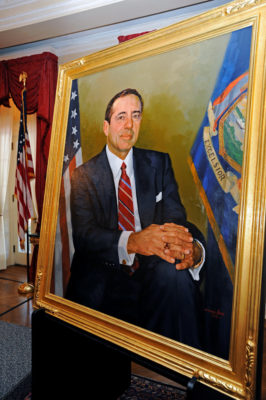
A: Twelve years is a long time. Certainly enough time to [build up] enemies, so to speak, by that point. It’s hard for me to see him running for a fourth term at this point. I’m not saying it’s not possible. I guess if the attorney general’s report comes out and exonerates him he might run again. Certainly he has the campaign cash to do it. At the same time he might want to help shape who the next governor is. That might be his incentive. Or maybe he’ll take a position in the Biden administration. It’s possible, though he probably would have wanted the attorney general’s [position]. Clearly that ship has sailed. It’s hard to know what his next political move will be.
Q: Will a Republican win a statewide office?
A: I don’t think you’ll see a Republican U.S. senator anytime soon. But you look at other Democratic states like Maryland and Massachusetts and they have Republican governors. That kind of moderate Republican can win. And Cuomo’s a moderate. He’s not really hard left. He’s pretty palatable to a lot of people. But you see a lot of people feeling like their taxes are too high. If a left-of-center Democrat wins in 2022, I think that would open the door next time for a Republican to come in and say, “Look, you guys are paying too much in taxes. Elect me and [I’ll deal with that.]” I don’t think someone like Lee Zeldin has a realistic chance to win. He’s much too tied to the Trump part of the party. But if you get a moderate Republican there’s a chance. The conditions have to be right.
Q: Someone like George Pataki, who toppled Mario Cuomo in 1994?
A: Pataki was part of a data set in a book about governors. He’s able to get more done the longer he’s in office. He’s able to work with Democrats more. So he winds up being the kind of guy who had some claim to say that he worked in a bipartisan way. And somebody like Pataki could win again. And voters have to be fed up with Democrats and the way they’re running government.
Q: Any final thoughts?
A: Boy, what a last couple of months it’s been, [after] a couple of relatively quiet terms. Now it’s a question of his [political life]. I couldn’t really see this coming. There is also things you hear about Cuomo and you say, “Yeah, that does sound like him. And he is a bit of a bully.”
Burnett admitted that he would have loved to have been teaching his state and local government class this semester.
“There would have been much to talk about. Especially as we’re getting down to the wire on the budget. I’m curious as to how that all plays out,” he said.
At the time of this interview, the budget negotiations were still ongoing. State leaders reached a budget agreement on April 6.



















